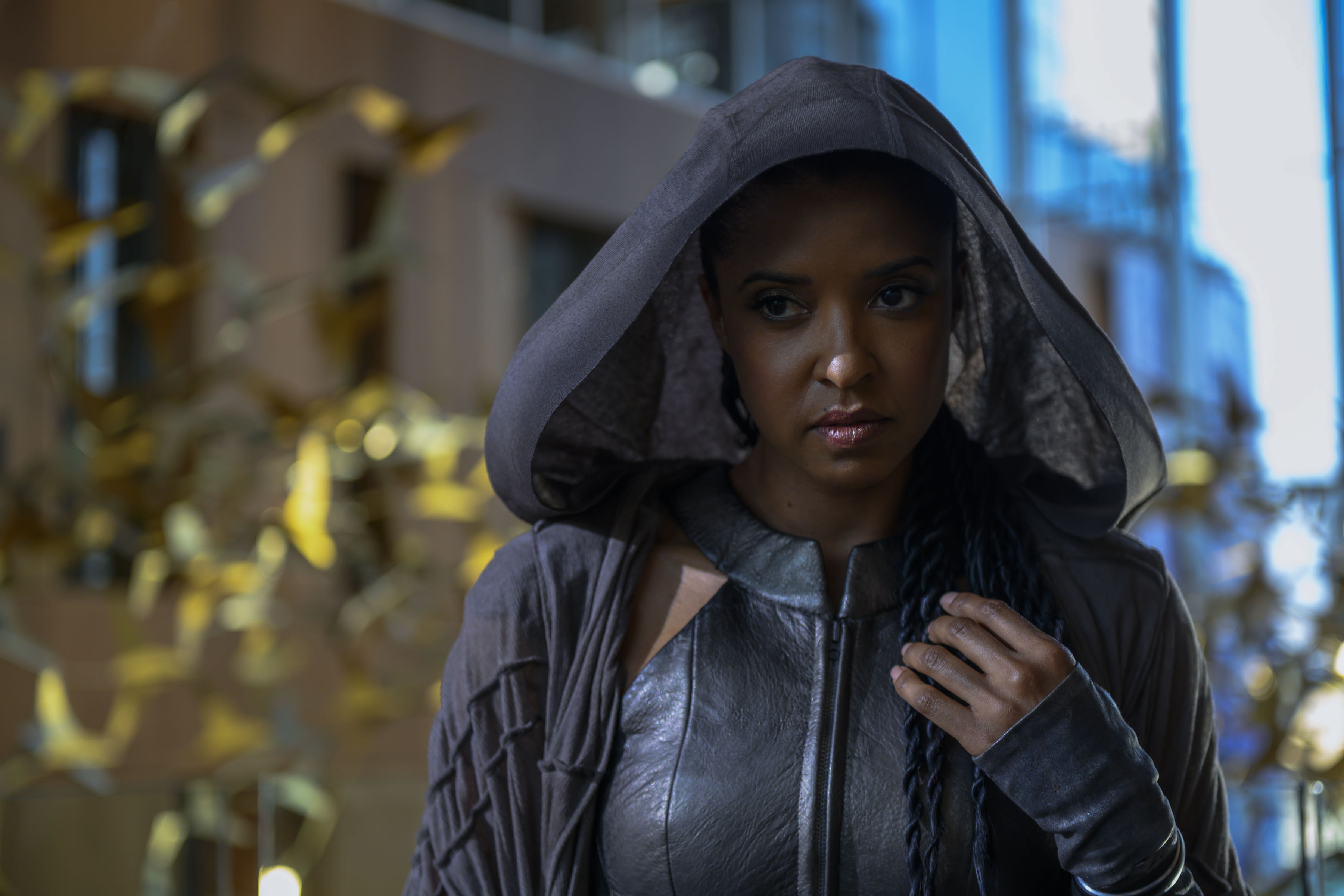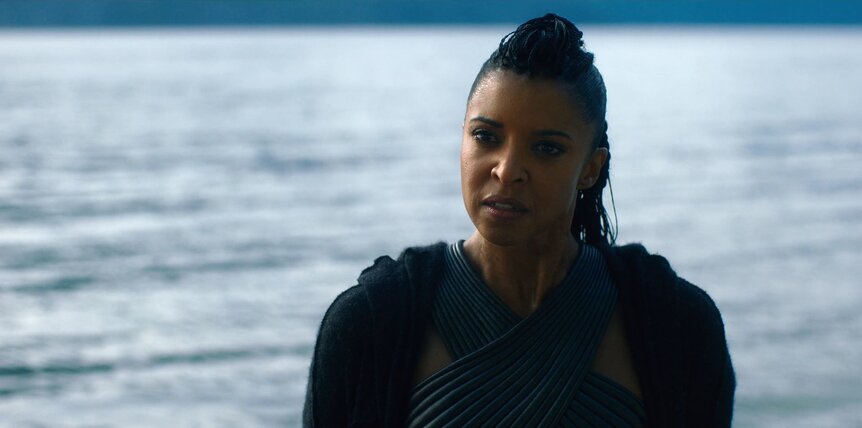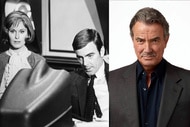Create a free profile to get unlimited access to exclusive videos, sweepstakes, and more!
The secrets behind Altered Carbon Season 2's big twist and outsmarting fans: They're 'chess players'

Renée Elise Goldsberry could never be sure how to play Altered Carbon's revolutionary leader Quellcrist Falconer. In Season 1, the character was a memory, a figment of Takeshi Kovacs' imagination. That idealized version was perfect, prodding Tak to survive. But in Season 2, Quell was a real woman, albeit one who didn't seem to recognize or remember herself.
We in the audience were kept in suspense about the reason why until Episode 7, and so was the actress — the scripts were still coming as shooting progressed. Concerned that she might make early choices that would later turn out to be inappropriate (depending on what Quell's secret turned out to be), Goldsberry decided to do each scene in a number of different ways.
**This story contains spoilers for Altered Carbon.**
"I was so worried about that," she tells SYFY WIRE. "Every day, I would check in with [showrunner] Alison Schapker, or [writer] Sarah Nicole Jones, or [executive producer] James Middleton, and I would be like, 'I'm going to do a couple of different versions. Please make a note that they're there?' It was something I had to figure out while I was doing it, and it was trial and error."
Of particular concern, Goldsberry says, was that she adhere to the rules created for the world and for Quell. For example, she says, "Quell has Envoy intuition and training, so why would she be upset if she's killing people? She doesn't care if she kills people, as long as it's for a mission. Okay, so let's make sure she's only upset that she's killing people because she doesn't know why she's killing them."
Once Goldsberry learned what was happening with her character — that Quell was sharing her body with an alien consciousness, referred to as an "Elder" in Altered Carbon lingo — she came up with an on-set nickname for this version of Quell: Quellder. And Quellder, accordingly, has a different agenda, a different fighting style, even a different way of expressing emotion.
"I had to figure out what rage looks like on Quellder," Goldsberry says. "What is too much? What is not enough for what she's suffered? She's been wronged in the worst way." (That wrong being the genocide of the Elder's cocooned children by Konrad Harlan and the Founders.)
Even though the Elder swapped bodies from Quellcrist to Carrerra to Kovacs, Goldsberry says she felt ownership of the Elder character. "I was policing more than my own work," she says. "I was policing the other characters, the other actors! Like, 'How can he do that as the Elder, if I couldn't do that?' It was a constant game, because the fans are chess players, so we have to make sure we're doing our due diligence."
Working out the psychology of both the Quell and Quellder characters was particularly tricky for Goldsberry because unlike her co-stars, she didn't have the source material to fall back on. Season 2 borrows elements from two of Richard Morgan's book series about Takeshi Kovacs, Broken Angels and Woken Furies; Broken Angels for Carrerra's Wedge unit and their combat sleeves with wolf gene splicing (for added speed, savagery, and pack loyalty), and Woken Furies for the return of Quellcrist Falconer (via shared consciousness). But the stories and the characters are incredibly different.
First, Quell in the show isn't quite the same character as Quell in the books. Show Quell is more of an amalgam of several book characters, including Nadia Makita (Quell's real name), Virginia Vidaura (Tak's Envoy trainer), and Sarah Sachilowska (Tak's driving-force love). The two souls sharing one body are both human, not alien, and Quell is the invader, not the host. Alien tech is involved, but no aliens, and consequently Quellcrist's righteous anger is not about exacting revenge for an alien genocide, as in the show. Although she has a similar mission — destroy the Harlan family — her reasons are all too human, as are her methods, as she also lacks the godlike power that Quellder has. Book Quell's assassination attempts are distanced, delayed — not up close and immediate — and also go against Quellcrist's own philosophy, as Tak is quick to point out because it's a DNA modification designed to haunt the Harlanites for generations, punishing innocent parties.
Still, there was something about that idea — "everybody being haunted by the past, this planet being haunted" — that appealed to the Altered Carbon writers, and which they wanted to retain. "I find it's hard enough to live just one life, with all the baggage you carry around," Schapker says. "I can't even imagine extending that to an immortal life. But the idea that history haunts us is still true and relevant today, with the legacies of previous generations that we all have to reckon with on our own planet, whether that be climate change or whatever." For the world of Altered Carbon, this became a moral consideration of the legacy of imperialism and colonialism, and our responsibility for indigenous victims.
Schapker was also intrigued by how the interplanetary societies within Altered Carbon didn't comprehend the alien tech they used. "I'm obsessed with the limits of human knowledge," she says, "and how we don't act like we have limits to it. The Romans had their aqueducts, and they thought they were great. 'We're going to use this lead, and we're going to run the water down this, and oh my God! We have drinking water! We're so smart.' And then they all had lead poisoning." What if the alien alloy that the people in Altered Carbon put in their bodies to achieve immortality is analogous to that? As Schapker points out, "They never imagine that the technology has an alien consciousness copied in it that now they're vulnerable to," not just Quell.
Goldsberry hopes that Quellcrist uses this knowledge as she moves on to other planets in Season 3. "She now has had an intimate relationship with this Elder civilization," she says, "and she realizes that rebels should be more responsible about how they move forward with their ultimate mission, the battle for humanity against the Protectorate and against this stack technology that Quell created."
"It feels like there is a cautionary tale in Altered Carbon," Schapker adds. "It's something we should all be thinking about as our society makes technological advances. Let's always have a little humility around what we're doing."















